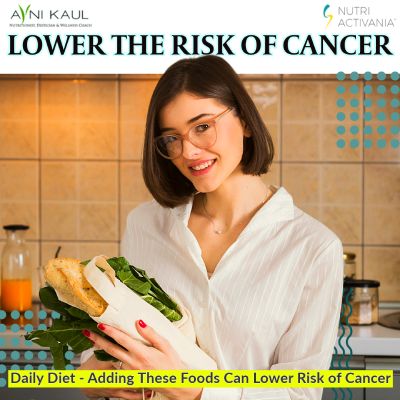No matter how much you care for your health, life is unpredictable. Despite our best efforts to maintain good health, cancer can still strike unexpectedly. Studies reveal that about 1 in 5 people develop cancer in their lifetime, with approximately 1 in 9 men and 1 in 12 women succumbing to the disease. While genetics and other uncontrollable factors play a role, our daily choices, particularly regarding diet, hold significant sway over our health outcomes. There is indeed no single food that can prevent cancer like magic. However, the eminent dietitian and nutritionist, Avni Kaul says, that including certain foods in your daily diet possibly can reduce the risk of cancer.
What foods do you need to add that may help reduce the risk of cancer?
FRUITS
Apples contain plant-based compounds called polyphenols that may aid in preventing inflammation, cardiovascular disease, and infections. Studies suggest that polyphenols might regulate specific processes that could contribute to the development of cancer. It is said that Phloretin present in apples inhibits Colorectal Cancer Cell Growth.
Berries: Do you love berries? Then you’ll be glad to know that berries, like strawberries, blueberries, cranberries, and black raspberries, are rich in antioxidants such as vitamin C and flavonoids, which shield cells from stress and DNA damage, lowering cancer risk. Anthocyanins, responsible for their vibrant colors, possess anti-inflammatory properties, crucial as inflammation can promote cancer. Additionally, strawberries and raspberries contain ellagic acid, a potent antioxidant that combats cancer by deactivating harmful substances and impeding cancer cell growth.
Grapes: Red and purple grapes, along with their juice, contain resveratrol, known for potent antioxidant and anti-inflammatory effects. Lab studies suggest it may prevent cell damage linked to cancer. However, evidence on cancer prevention or treatment through grape consumption is still insufficient.
VEGETABLES
Cruciferous Veggies – Besides containing essential nutrients such as vitamin C, vitamin K, and manganese, cruciferous vegetables also contain sulforaphane, a plant compound that can effectively slow down cancer cell growth and induce cell death in colon cancer cells. Moreover, when combined with genistein, a compound found in soybeans, sulforaphane has been found to significantly inhibit the development and size of breast cancer tumors. Additionally, sulforaphane inhibits histone deacetylase, an enzyme associated with cancer development. Broccoli sprouts, in particular, are rich in sulforaphane, which can enhance the body’s natural defense mechanisms against daily cellular damage. Studies suggest that sulforaphane may provide protection against various cancers, including prostate, breast, bladder, and colorectal cancer. Consumption of 3–5 servings of cruciferous vegetables per week may offer cancer-preventive benefits.
Carrots, rich in beta-carotene, an antioxidant help to protect the cell membranes from toxin damage and slow cancer growth. Phytochemicals and other vitamins present in carrots protect against cancers of the mouth, esophagus, and stomach. Some studies reveal that carrots may also help prevent cervical cancer. They contain falcarinol, an organic pesticide with anti-inflammatory properties.
Legumes like beans, peas, and lentils are rich in fiber which helps to prevent cancer, particularly colorectal and breast cancer. The presence of an antioxidant lycopene in tomatoes helps prevent prostate cancer.
NUTS
Studies suggest that regular consumption of nuts reduces the risk of colorectal, pancreatic, and endometrial cancers. Brazil nuts high in selenium can protect you from lung cancer. Walnuts contain lots of ellagitannins, which are plant compounds. When our gut bacteria break these down, they produce substances that can slow down cancer growth. Walnuts also have pedunculagin, which our bodies turn into urolithins. Urolithins can attach to estrogen receptors and might help prevent breast cancer.
GARLIC & ONION
Research shows that garlic and onions can stop the formation of harmful substances called nitrosamines, which can cause cancer in various parts of the body like the colon, liver, and breasts. The strong smell of garlic or onion indicates the presence of a good amount of sulphur compounds which are known to protect the body against carcinogenic material and speed up DNA repair. Allicin, found in garlic, has been shown to kill cancer cells in lab tests. Eating more garlic may lower the chances of getting stomach, prostate, and colorectal cancers.
FISH
Fatty fish like salmon, herring, or tuna contain omega-3 fatty acids that may lower the risk of prostate cancer.
Now that you know the potential cancer-fighting power of various foods like fruits, vegetables, nuts, and garlic, incorporating them into your daily diet can be a proactive step towards reducing your risk of cancer and promoting overall health and well-being.



